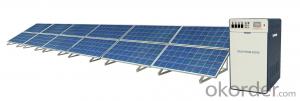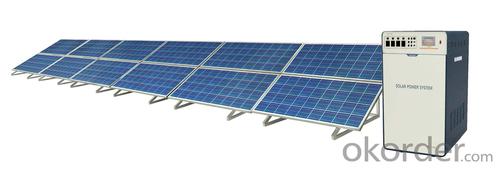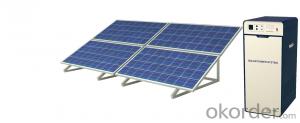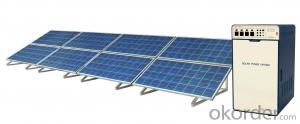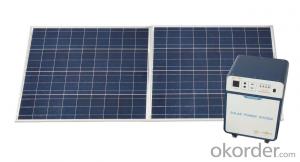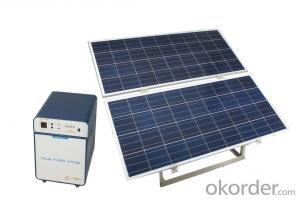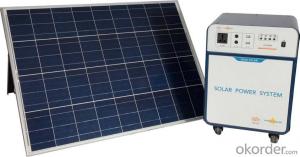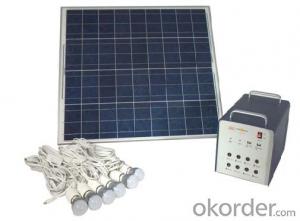Solar Energy Systems South Bend - Off-Grid Solar Power System JS-SPS-3000
- Loading Port:
- Tianjin
- Payment Terms:
- TT OR LC
- Min Order Qty:
- 10 set
- Supply Capability:
- 10000 set/month
OKorder Service Pledge
Quality Product, Order Online Tracking, Timely Delivery
OKorder Financial Service
Credit Rating, Credit Services, Credit Purchasing
You Might Also Like
General Introduction
Solar power system provides alternating current and direct current, which is produced by the modules transforming solar power into power, to home lighting, household appliance and other DC appliance, such as cell phone and laptop.
Solar power system is widely used in area lack of power, for example house power supplying, monitoring, communication base, fire prevention in forest area, pasture and meadow, aquaculture etc.
We are dedicated to provide high quality off-grid PV products and systems to customers and has received a series of certificate, including ISO9001, TUV, UL, CE, CQC and RoHS.
Off-grid Solar Power System
High efficent PV module can produce more power.
Sine wave output is suitable for all kinds of load. Varieties of DC output, let it more
convenient for users.
The multifunction design make it easy to operation and maintenance.
Solar power system provides alternating current and direct current, which is produced by the modules transforming solar power into power, to home lighting, household appliance and other DC appliance, such as cell phone and laptop.
Solar power system is widely used in area lack of power, for example house power supplying, monitoring, communication base, fire prevention in forest area, pasture and meadow, aquaculture etc.
We are dedicated to provide high quality off-grid PV products and systems to customers and has received a series of certificate, including ISO9001, TUV, UL, CE, CQC and RoHS.
Off-grid Solar Power System
High efficent PV module can produce more power.
Sine wave output is suitable for all kinds of load. Varieties of DC output, let it more
convenient for users.
The multifunction design make it easy to operation and maintenance.
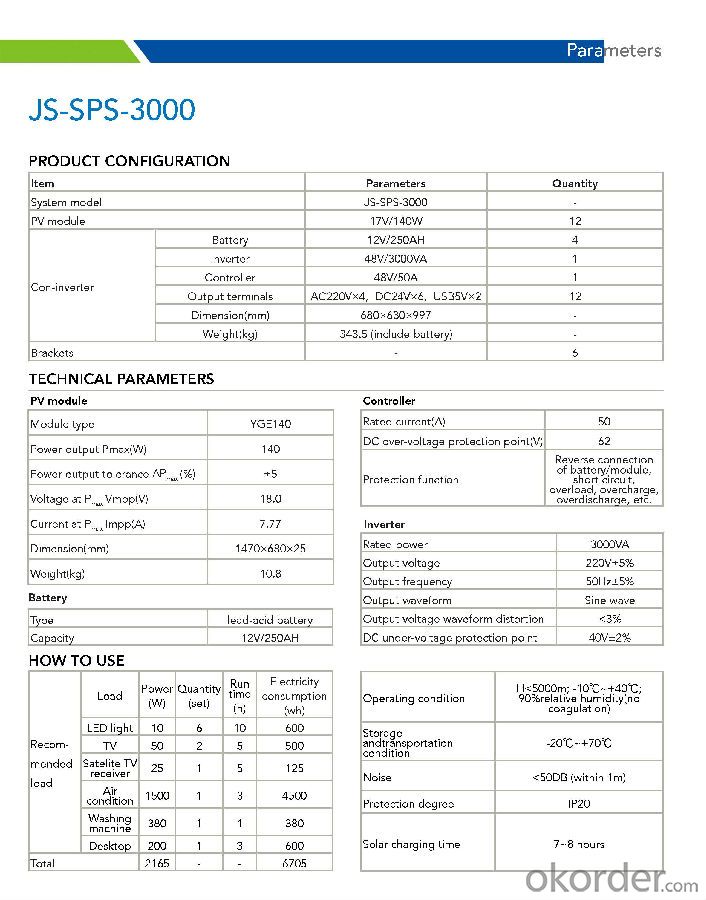
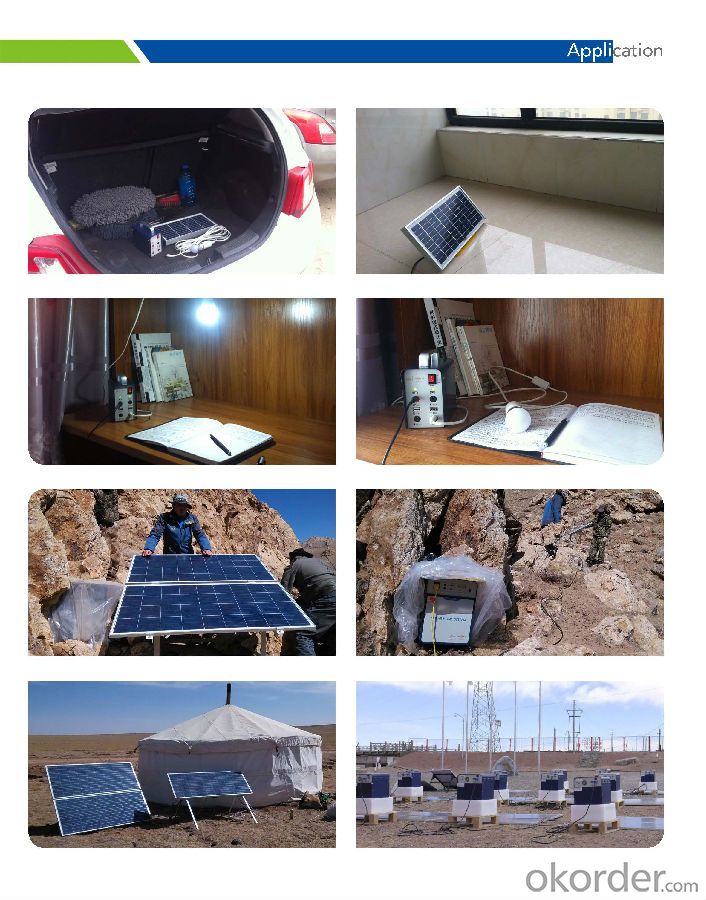

- Q: How do solar energy systems impact the resale value of a home?
- The installation of solar energy systems in homes can greatly benefit their resale value. Numerous studies have revealed that homes equipped with solar panels tend to sell at a faster pace and for a higher price compared to homes without solar energy systems. This is primarily due to the fact that solar panels provide potential buyers with significant long-term savings on their energy expenses. One of the major advantages of solar energy systems lies in their ability to generate electricity from a sustainable source, thereby reducing the dependence on traditional fossil fuels. This not only benefits the environment but also results in cost savings through reduced energy bills. Prospective buyers are often drawn to homes with solar panels as they recognize the long-term financial advantages of owning a property that generates its own electricity. Furthermore, numerous countries and states offer a variety of incentives and tax credits to homeowners who choose to install solar panels. These financial benefits further enhance the attractiveness of homes equipped with solar energy systems, as buyers may be able to take advantage of these incentives themselves. Additionally, solar energy systems are known to enhance the energy efficiency of homes. By harnessing the sun's energy, homeowners can significantly reduce their reliance on the power grid, leading to a decrease in overall energy consumption. In today's market, energy-efficient homes are highly sought after, as they not only lower utility costs but also contribute to a more environmentally friendly and sustainable future. However, it is important to note that the impact of solar energy systems on the resale value of a home may vary depending on factors such as location, size, and efficiency of the system. Therefore, it is advisable to consult with local real estate professionals or appraisers to obtain a more accurate understanding of the specific impact on resale value in a particular area. In conclusion, the installation of solar energy systems can positively affect the resale value of homes by reducing energy bills, providing long-term cost savings, and improving overall energy efficiency. As sustainability and renewable energy become increasingly important, homes equipped with solar panels are becoming more appealing to potential buyers, resulting in faster sales and higher selling prices.
- Q: Can solar energy systems be used for powering shopping malls?
- Certainly, shopping malls can indeed utilize solar energy systems to power their operations. The sun's energy can be captured by installing solar panels on the rooftops or parking lots of shopping malls. This captured energy can then be converted into electricity, which can be used to power various functions within the mall, such as lighting, heating and cooling systems, escalators, elevators, and other electrical appliances. By embracing solar energy, shopping malls can greatly reduce their reliance on conventional energy sources and decrease their carbon emissions. Moreover, solar energy systems can contribute to long-term electricity cost savings for malls, as they produce clean and renewable energy. All in all, solar energy systems offer a feasible and sustainable solution for meeting the power needs of shopping malls.
- Q: Can solar energy systems be used to heat water?
- Yes, solar energy systems can be used to heat water. Solar thermal systems, also known as solar water heaters, utilize the sun's energy to heat water for various purposes such as domestic use, swimming pools, or industrial applications. These systems absorb sunlight through solar collectors and transfer the heat to water, providing an efficient and sustainable way to heat water using solar power.
- Q: Can solar energy systems be used in areas with high levels of hail or other severe weather conditions?
- Yes, solar energy systems can be used in areas with high levels of hail or other severe weather conditions. While severe weather conditions like hail can potentially damage solar panels, modern solar panels are designed to withstand various weather conditions, including hailstones of a certain size and velocity. Solar panels are typically made with durable materials such as tempered glass and are tested to withstand hailstones of a specific size and impact force. They are engineered to be strong enough to endure hailstorms without shattering or losing their efficiency. Additionally, solar panels are often installed at an angle to allow hailstones to slide off rather than directly impact the surface, further minimizing the risk of damage. Furthermore, advancements in solar technology have led to the development of more robust and resilient solar panels. For instance, some manufacturers offer panels with enhanced hail-resistant features, such as reinforced glass or protective coatings, to provide extra durability in areas prone to severe weather conditions. It is important to note that while solar panels can withstand hail, the severity and frequency of the hailstorms should be taken into consideration when planning and installing solar energy systems. Local weather patterns and historical data can help assess the risk level and determine the appropriate measures for protecting the panels, such as using hail guards or installing additional protective layers. In conclusion, solar energy systems can be used in areas with high levels of hail or other severe weather conditions as long as the panels are designed and installed to withstand such conditions. Proper planning, the use of resilient materials, and periodic maintenance can help ensure the long-term performance and durability of solar energy systems in these areas.
- Q: Can solar energy systems be used in powering movie theaters or entertainment venues?
- Certainly, movie theaters and entertainment venues can absolutely utilize solar energy systems to provide power. The operation of these venues requires a substantial amount of electricity for their lighting, sound systems, projectors, and other equipment. Solar energy systems have the ability to generate clean and renewable electricity by harnessing the sun's power. By installing solar panels on the roofs or in the surrounding areas of these venues, they can generate a significant amount of electricity to fulfill their energy requirements. Not only can solar energy systems be designed to supply power for the basic infrastructure of movie theaters or entertainment venues, but they can also support additional energy-intensive features such as HVAC systems, concession stands, and even electric vehicle charging stations. By utilizing solar energy, these venues can greatly reduce their dependence on grid electricity, decrease operational expenses, and contribute to a more sustainable and environmentally friendly future. Besides the practical advantages, the installation of solar energy systems in movie theaters or entertainment venues can also serve as a demonstration of environmental responsibility and attract environmentally conscious audiences. Many individuals are becoming increasingly aware of the significance of renewable energy, and by showcasing their commitment to sustainability, these venues can enhance their brand image and appeal to a wider customer base. In conclusion, the utilization of solar energy systems to power movie theaters or entertainment venues is not only technically viable but also financially and environmentally beneficial. By harnessing the sun's power, these venues can diminish their carbon footprint, save on energy costs, and contribute to a greener future for the entertainment industry.
- Q: Can solar energy be used in cloudy climates?
- Yes, solar energy can still be used in cloudy climates. While the efficiency of solar panels may decrease in cloudy conditions, they are still capable of generating electricity. Additionally, advancements in solar technology, such as the use of thin-film solar cells, have improved the ability to harness solar energy even in low light conditions.
- Q: Can solar energy systems be used for transportation purposes?
- Yes, solar energy systems can be used for transportation purposes. Solar-powered vehicles, such as solar cars, boats, and even airplanes, are being developed and used as a more sustainable alternative to fossil fuel-powered transportation. These vehicles use solar panels to convert sunlight into electricity, which powers the vehicle's motor. While solar energy may have limitations in terms of efficiency and storage capacity, advancements in technology are making solar-powered transportation increasingly viable and promising.
- Q: What are the main components of a solar energy system?
- The main components of a solar energy system include solar panels, an inverter, a charge controller, batteries (if it's an off-grid system), and a power meter (if it's an on-grid system).
- Q: Can solar energy systems be used in areas with high levels of saltwater exposure?
- Yes, solar energy systems can be used in areas with high levels of saltwater exposure. However, it is important to choose the right materials and components that are resistant to corrosion caused by saltwater. Additionally, regular maintenance and cleaning may be required to ensure optimal performance and longevity of the solar panels.
- Q: How do solar energy systems reduce carbon emissions?
- Solar energy systems reduce carbon emissions by converting sunlight into electricity or heat without burning any fossil fuels. Unlike traditional energy sources such as coal or natural gas, solar energy does not release any greenhouse gases or pollutants into the atmosphere during operation. This means that using solar energy reduces the dependence on fossil fuels, which are major contributors to carbon emissions and climate change. By harnessing the power of the sun, solar energy systems help to mitigate the environmental impact of energy production and promote a cleaner and more sustainable future.
Send your message to us
Solar Energy Systems South Bend - Off-Grid Solar Power System JS-SPS-3000
- Loading Port:
- Tianjin
- Payment Terms:
- TT OR LC
- Min Order Qty:
- 10 set
- Supply Capability:
- 10000 set/month
OKorder Service Pledge
Quality Product, Order Online Tracking, Timely Delivery
OKorder Financial Service
Credit Rating, Credit Services, Credit Purchasing
Similar products
Hot products
Hot Searches
Related keywords
